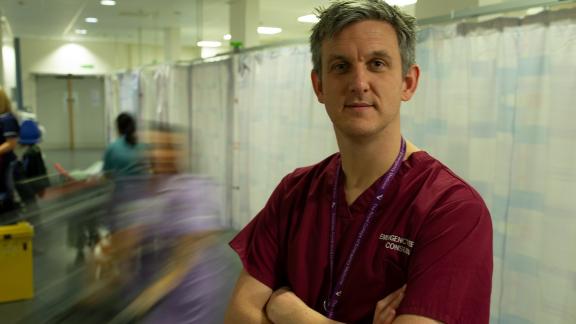Bringing the voices of clinicians into our influencing work

The position in healthcare policy and management can sometimes be one in which guidance is passed down in a hierarchy, from leaders to operational staff and finally to clinicians. This can leave staff who can bring the most to the table being left out of the discussion.
At the NHS Confederation, and particularly through the Acute Network which I am involved with, we very much want to begin to rebalance these relationships in a way that allows insights from all levels to feed into our work.
Whether we are talking about the pressures and demands faced by services, patient outcomes, quality of care, reducing waiting times, productivity or any number of other issues, we recognise the importance of understanding these challenges through the lens of those who directly provide care.
I know this because I am a practicing clinician, with a background of working across a number of acute hospitals in A&E services, and I am currently employed as a consultant at University Hospitals of North Midlands NHS Trust.
I know that when clinicians are not fully engaged in the decision making process, solutions can lack efficacy, but they can also lead to unintentional consequences for patients.
Outside of the clinical and leadership roles that I have taken on through my trust, I have recently become part of the Acute Network team at the NHS Confederation as an acute clinical advisor. I am pleased to be part of this changing direction, supporting both the Primary and Secondary Care Interface improvement Programme, and the network’s Acute Clinical Reference Group, which is being relaunched with a new focus.
The renewed focus of our clinical reference group is to share experiences around patient safety, risk and clinical outcomes that need to be included in policy making decisions. It is about bringing clinical staff into discussions that are already taking place within the wider organisation about how we engage with government, policies and national interests. Fundamentally, it is about co-creating the solutions that matter to us all.
We want to ensure that the group is as open and inclusive as possible, reflecting the breadth of clinical disciplines, as well as being representative of members working in different parts of the country, so that anyone wishing to participate is able to do so.
Objectives of the clinical reference group:
- Peer learning: Sharing experiences, insights and lessons on key topics to understand how challenges might be addressed.
- Influencing: To ensure the clinical voice is used to influence and engage with decision making at a national level.
- Co-creating solutions: To tackle issues together and recommend changes for specific patient safety issues to help drive improvement.
- Expert advice: To offer advice and guidance from a clinical and patient safety perspective to the wider NHS Confederation on a range of matters.
By opening the conversation up to include the clinical voice, we gain two obvious benefits – solutions and policy interventions will end up having much stronger buy-in, and the degree to which unintended harm can follow any potential intervention is greatly limited.
To focus on a particular example – that of reducing elective waiting lists, we know that there is a push from government to fast-track appointments and shift to a high-intensity approach to clearing the backlog quickly – on weekends, at evenings, and so on. But only clinicians from their respective specialties will have a sense of what that means for patients in practice, and what the risks may be for changing the operating model, not to mention the impact on the staff themselves. That doesn’t mean to say that these are not the right solutions, but it does mean that these considerations need to be a core part of the discussion, so that the most optimal strategy can be identified.
There are many other examples too. When it comes to influencing, the NHS Confederation comments on a wide range of policy interventions, from Martha’s rule to proposed legislation to end the practice of fixed visiting hours and issues with maternity care, just to name a few. While this work is already intimately informed by our members, having an additional route for engaging with staff who are delivering care will help to ensure that our positions remain well rounded, with a balance between operational and clinical perspectives.
It is important that all of these conversations are balanced and clinically informed, and through my new role as the Acute Network’s clinical advisor, I am very much looking forward to chairing each of these sessions and using my clinical experience to facilitate and guide the discussions.
Get involved
If you would like more information about the group, including details on our upcoming meetings and how to join, please contact sonia.nosheen@nhsconfed.org.
Dr Chris Pickering is acute clinical advisor for our Acute Network and a consultant in emergency medicine at University Hospitals of North Midlands NHS Trust. You can follow Chris on X at @drpickers.



